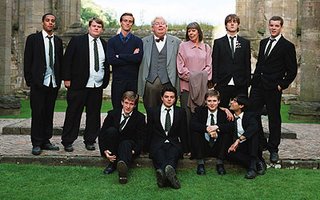 The History Boys
The History Boys, the film version of the multi-award-winning play by Alan Bennett reunites the cast and director (Nicholas Hytner) from the theatre production for a snappy trip down memory lane for the 1983 graduating class in a Sheffield secondary school. As the film opens, a small group of nine high-achieving students, having just received their A-level results, are gathered together by their headmaster for an extra term to prepare for the Oxford and Cambridge entrance exams in December.
Their favourite teacher Hector, played by the hugely entertaining Richard Griffiths (who steals the show here), tutors his charges in a loose, free-flowing curriculum covering everything from Vera Lynne torch songs to the Socratic Dialogues. The pretentious, blustering Hector argues for A.E. Houseman’s dictum that “all knowledge is precious whether or not it serves the slightest human use”. Although married, “unexpectedly” according to his colleagues, Hector is gay, frequently touching his students inappropriately while giving them a lift home on his motorbike. Oddly, and just one of the implausibilities that damage the film, none of the students seem to mind Hector’s lecherous attentions, being devoted to the portly old rogue and all seeing the clear benefits of his scholarship and his wisdom.
Although his methods might be unorthodox, and crustily old fashioned, his commitment to his pupil’s mental advancement is not. Bennett gives Hector long, dextrous monologues, full of historical anecdotes and witty wordplay, that mark him out among the cast as the repository of philosophical education, concerned more with their joining the dots in their education than achieving high grades. All too aware of his staff’s inability to bring students on to the next phase of their education, vinegary headmaster (Clive Merrison) brings in a specialist, Mr. Irwin (Stephen Campbell Moore), a cynical Oxford graduate, to tutor the boys in how to pass the exam and interview that will determine if they get to walk among the dreaming spires.
Hytner, who previously collaborated with Bennett to great success on The Madness of King George expertly and effortlessly captures the time and place, providing a perfect stage for deft, touching performances from both his young cast and the more familiar veterans. He is assisted tremendously in setting his mood by a classic soundtrack of early 80s British pop. It is the obvious chemistry shared by the large ensemble, and the fluency of their constantly shifting allegiances and motivations, that offer the best in the film. Of the nine younger actors, Dominic Cooper playing the cool, manipulative Dakin and Samuel Barnett as Posner, the conflicted teenager who is in love with him and clearly Bennett’s surrogate, that excel but the entire class give strong performances in what are complicated roles.
The theme here is knowledge and its application in the real world coupled with sidebars into the duty of educators to mould minds, the right-wing politics of early 1980s conservative England and the tangled mess of teenage male uncertainties, most of which have to do with questions about sexuality. Some of the plays darker themes – on the manipulation of history by politicians and the insidious influence of the media - have not made it to the screen, with what has survived being underplayed for the most part, barring one uncomfortable scene between Dakin and Mr. Irwin that is as cold and chilling as it is brilliantly played. Some of the large cast, Frances De La Tour in particular (as the world-weary Mrs. Lintott), are unhappily relegated to the background, the side-effect of trimming a large playbook into a feasible screenplay. There is still plenty of smart humour to be found in The History Boys, a constant stream of howling one-liners and witty references whizzing around the classroom, particularly during one early scene conducted entirely in French, but it doesn’t all come together entirely satisfactorily, a final scene giving us a flash-forward to what the students became adding unmerited pathos at the same time as providing a convenient conclusion.
 The History Boys, the film version of the multi-award-winning play by Alan Bennett reunites the cast and director (Nicholas Hytner) from the theatre production for a snappy trip down memory lane for the 1983 graduating class in a Sheffield secondary school. As the film opens, a small group of nine high-achieving students, having just received their A-level results, are gathered together by their headmaster for an extra term to prepare for the Oxford and Cambridge entrance exams in December.
The History Boys, the film version of the multi-award-winning play by Alan Bennett reunites the cast and director (Nicholas Hytner) from the theatre production for a snappy trip down memory lane for the 1983 graduating class in a Sheffield secondary school. As the film opens, a small group of nine high-achieving students, having just received their A-level results, are gathered together by their headmaster for an extra term to prepare for the Oxford and Cambridge entrance exams in December. The History Boys, the film version of the multi-award-winning play by Alan Bennett reunites the cast and director (Nicholas Hytner) from the theatre production for a snappy trip down memory lane for the 1983 graduating class in a Sheffield secondary school. As the film opens, a small group of nine high-achieving students, having just received their A-level results, are gathered together by their headmaster for an extra term to prepare for the Oxford and Cambridge entrance exams in December.
The History Boys, the film version of the multi-award-winning play by Alan Bennett reunites the cast and director (Nicholas Hytner) from the theatre production for a snappy trip down memory lane for the 1983 graduating class in a Sheffield secondary school. As the film opens, a small group of nine high-achieving students, having just received their A-level results, are gathered together by their headmaster for an extra term to prepare for the Oxford and Cambridge entrance exams in December.







No comments:
Post a Comment